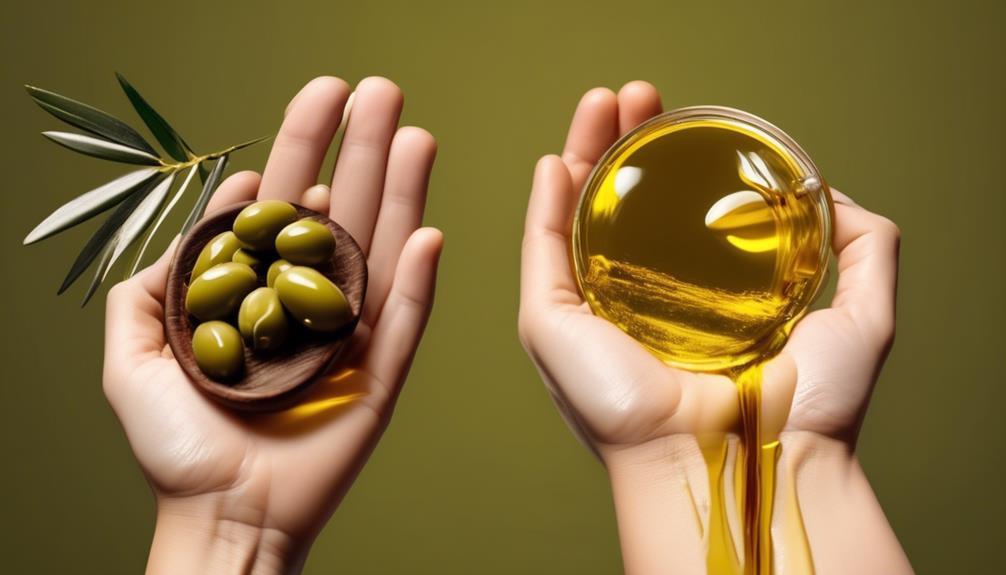Which is better for hair castor oil or olive oil? So, you’re on a quest for luscious locks, huh? Well, look no further than the age-old debate of castor oil versus olive oil for your precious strands.
It’s a battle of the oils, each claiming to be the ultimate elixir for hair perfection. But which one truly reigns supreme? Ah, that’s a question that has left many scratching their heads and pondering in front of the mirror.
But fear not, my curious friend, for we are about to embark on a journey to uncover the truth behind these liquid wonders, and perhaps, just perhaps, find the secret to the hair of your dreams.
Key Takeaways
- Castor oil promotes hair growth and prevents hair loss.
- Olive oil moisturizes and nourishes hair, leaving it soft and shiny.
- Castor oil may cause scalp irritation and has a heavy texture.
- Olive oil reduces frizz, repairs damage, and leaves hair smooth.
Benefits of Castor Oil for Hair

Discover the amazing benefits that castor oil can bring to your hair, leaving it healthier, stronger, and more lustrous than ever before. Castor oil is rich in nutrients, such as vitamin E, omega-6 fatty acids, and proteins, which are essential for promoting hair growth and preventing hair loss. The moisturizing properties of castor oil help to nourish the hair follicles, making your hair less prone to breakage and split ends. Regular use of castor oil can also reduce scalp inflammation and dandruff, improving the overall health of your scalp.
One of the key benefits of castor oil for hair is its ability to enhance hair thickness and volume. The oil’s high concentration of ricinoleic acid helps to stimulate blood circulation in the scalp, promoting the growth of thicker and fuller hair. Castor oil also contains natural antifungal and antibacterial properties, which can help to combat scalp infections and improve the overall condition of your hair.
However, it’s important to note that castor oil may not be suitable for everyone. Its thick consistency can make it difficult to wash out, leaving behind a greasy residue. Additionally, some individuals may experience allergic reactions or scalp irritation when using castor oil. It’s always recommended to perform a patch test before applying it to your entire scalp and hair.
Drawbacks of Castor Oil for Hair
When it comes to using castor oil for your hair, there are a few drawbacks to consider.
Firstly, castor oil has the potential to cause scalp irritation, especially for those with sensitive skin.
Additionally, its heavy and greasy texture can make it difficult to apply and distribute evenly throughout your hair.
Lastly, removing castor oil from your hair can be a challenge, as it tends to cling to strands and requires multiple washes to fully remove.
Scalp Irritation Potential
If you’re considering using castor oil for your hair, it’s important to be aware of its potential drawback: scalp irritation.
While castor oil is known for its moisturizing properties, it can sometimes lead to scalp dryness, which can cause discomfort and itchiness. This is especially true if you have a sensitive scalp or if you use castor oil in excess.
In some cases, people may also experience allergic reactions to castor oil, resulting in redness, swelling, or even a rash on the scalp.
It’s crucial to perform a patch test before using castor oil on your hair to check for any adverse reactions. If you notice any signs of irritation or discomfort, it’s best to discontinue use and consult a dermatologist for further guidance.
Heavy and Greasy Texture
After considering the potential scalp irritation caused by castor oil, it’s important to also discuss the drawbacks of its heavy and greasy texture for hair.
While castor oil is known for its nourishing properties, its thick consistency can make it difficult to spread evenly throughout the hair. This can lead to a heavy and weighed-down feeling, making your hair appear greasy and flat.
If you’re looking for an alternative hair oil that’s lightweight and won’t leave your hair feeling heavy or greasy, there are plenty of options to choose from. Argan oil, for example, is a lightweight oil that’s easily absorbed by the hair, leaving it feeling soft and silky without the greasy residue.
Jojoba oil and almond oil are also great alternatives that have a lighter texture and provide similar benefits for your hair.
Difficult to Remove
The thick consistency of castor oil can make it a challenge to remove from your hair. While castor oil is known for its numerous benefits for hair health, such as promoting hair growth and preventing breakage, its difficult removal process can be a drawback.
Here are some alternative options you can consider if you find it hard to remove castor oil from your hair:
- Pre-shampoo treatment: Before shampooing, apply a lightweight oil like coconut or almond oil to help break down the castor oil and make it easier to wash out.
- Clarifying shampoo: Use a clarifying shampoo once a week to help remove any buildup of castor oil in your hair. Look for a shampoo specifically designed to remove heavy oils and residues.
- Dilute the castor oil: If you still want to use castor oil but find it difficult to remove, try diluting it with a lighter oil, such as jojoba or grapeseed oil. This can make it easier to distribute and wash out.
Benefits of Olive Oil for Hair
Did you know that olive oil isn’t just for cooking but also for your hair?
Using olive oil can moisturize and nourish your hair, leaving it soft and shiny. It can also improve hair strength, reducing breakage and promoting healthy growth.
Say goodbye to frizz and damage with the natural benefits of olive oil for your hair.
Moisturizes and Nourishes
To achieve luscious, nourished locks, look no further than the incredible moisturizing power of olive oil. This natural ingredient has been used for centuries to keep hair healthy and hydrated.
Here are three reasons why olive oil is the ultimate moisturizer for your hair:
- Deep conditioning treatment: Olive oil penetrates the hair shaft, providing intense moisture from within. It helps to restore lost moisture, leaving your hair soft, smooth, and shiny.
- Split end prevention: Dry and brittle hair often leads to split ends. Olive oil helps to prevent this by moisturizing and nourishing the hair, reducing breakage and split ends.
- Scalp hydration: A healthy scalp is essential for healthy hair growth. Olive oil moisturizes the scalp, preventing dryness and flakiness, and promoting a healthy environment for hair to thrive.
Incorporating olive oil into your hair care routine will leave your locks looking and feeling their best. Say goodbye to dry, damaged hair and hello to a mane that’s nourished, hydrated, and full of life.
Improves Hair Strength
Enhance the strength of your hair with the incredible benefits of olive oil. Olive oil isn’t just a kitchen staple, but also a hair powerhouse.
When it comes to improving hair strength, this natural wonder can work wonders. Regularly applying olive oil to your hair can promote hair growth and improve overall hair health.
The rich antioxidants and vitamins found in olive oil nourish the scalp and strengthen the hair follicles, preventing breakage and promoting healthier, stronger hair.
The fatty acids present in olive oil also help to moisturize and protect the hair shaft, making it less prone to damage.
Reduces Frizz and Damage
If you’ve been looking for a solution to reduce frizz and damage in your hair, look no further than the incredible benefits of olive oil. This natural oil is packed with nutrients that can help nourish and protect your hair, leaving it smooth, shiny, and healthy.
Here are three ways olive oil can help reduce frizz and damage:
- Deep Conditioning: Olive oil acts as a deep conditioner, penetrating the hair shaft and moisturizing it from within. This helps to reduce frizz and restore moisture, making your hair more manageable.
- Split End Repair: Olive oil is rich in antioxidants and vitamins that can help repair and prevent split ends. By regularly applying olive oil to your hair, you can reduce the appearance of split ends and promote healthier, stronger hair.
- Hair Growth: The nutrients in olive oil, such as vitamin E and fatty acids, can help promote hair growth. Massaging olive oil into your scalp increases blood flow and stimulates hair follicles, leading to longer and thicker hair.
Incorporating olive oil into your hair care routine can make a noticeable difference in reducing frizz and damage, while promoting healthy hair growth.
Drawbacks of Olive Oil for Hair
While olive oil is often praised for its numerous benefits for hair, it’s important to be aware of the potential drawbacks it can have on your locks. One of the main drawbacks of using olive oil for hair is that it can be quite heavy and greasy. This can lead to a weighed-down and limp appearance, especially for those with fine or thin hair. Additionally, olive oil can be difficult to wash out completely, leaving behind a residue that can make your hair appear dull and greasy.
Another drawback of olive oil is that it may not be suitable for all hair types. If you have naturally oily hair, adding more oil can actually exacerbate the issue and make your hair greasier. On the other hand, if you have dry or brittle hair, olive oil may not provide enough moisture and nourishment.
Fortunately, there are alternative oils for hair care that can offer similar benefits without the drawbacks. For example, coconut oil is lightweight and easily absorbed by the hair, providing moisture and shine without weighing it down. Argan oil is another great option, as it’s rich in vitamins and antioxidants, helping to repair and strengthen damaged hair.
Comparison of Castor Oil and Olive Oil for Hair Growth

Castor oil and olive oil are both popular choices for promoting hair growth, but how do they compare in terms of effectiveness? Let’s take a closer look at the benefits of each oil:
- Castor oil: Known for its thick consistency and high vitamin E content, castor oil has long been touted as a hair growth remedy. It helps nourish the hair follicles, promoting stronger and healthier hair growth. Additionally, castor oil has antimicrobial properties that can help prevent scalp infections and dandruff, which can hinder hair growth.
- Olive oil: While olive oil may not be as well-known for its hair growth properties as castor oil, it still offers some benefits. Olive oil contains antioxidants and essential fatty acids that nourish the hair and scalp, promoting overall hair health. It can also help moisturize dry and damaged hair, reducing breakage and promoting hair growth indirectly.
- Effectiveness of olive oil for hair growth: While olive oil may not be as potent as castor oil when it comes to promoting hair growth, it can still be a beneficial addition to your hair care routine. Its moisturizing properties can help improve the overall health of your hair, making it less prone to breakage and promoting growth over time.
How to Use Castor Oil for Hair Care
To effectively incorporate castor oil into your hair care routine, follow these simple steps.
First, start by choosing a high-quality, cold-pressed castor oil. This ensures that you’re getting all the beneficial nutrients and vitamins that castor oil has to offer.
Next, warm up a small amount of castor oil in a microwave-safe bowl or in your palms. Gently massage the oil into your scalp using circular motions. This helps to stimulate blood flow and promote hair growth. Make sure to distribute the oil evenly throughout your hair, from roots to ends.
Leave the oil on for at least two hours, or overnight for maximum benefits. You can cover your hair with a shower cap or towel to prevent the oil from transferring onto your pillow.
Finally, rinse the oil out thoroughly with a mild shampoo and conditioner. Repeat this process once or twice a week to see the best results.
While castor oil has numerous benefits for hair, such as promoting hair growth and moisturizing the scalp, it does have some drawbacks. It can be quite thick and sticky, making it difficult to wash out completely. Additionally, some people may experience scalp irritation or allergic reactions. It’s always recommended to do a patch test before using castor oil on your hair.
How to Use Olive Oil for Hair Care
For effective hair care, incorporating olive oil into your routine is a simple yet beneficial step. Olive oil is a versatile and natural ingredient that can help nourish and condition your hair, leaving it healthy and shiny.
Here are three effective ways to use olive oil for hair care:
- Olive oil hair masks: Create a homemade hair mask by mixing olive oil with other natural ingredients like honey, yogurt, or avocado. Apply the mask to your hair, focusing on the ends and damaged areas. Leave it on for about 30 minutes before rinsing it out thoroughly. This will help moisturize and repair your hair, leaving it soft and manageable.
- Olive oil hot oil treatment: Heat a small amount of olive oil and apply it to your scalp and hair. Massage it gently and cover your hair with a shower cap. Leave it on for about 30 minutes to allow the oil to penetrate your hair follicles. The heat helps to open up the cuticles and allows the oil to deeply nourish and hydrate your hair. Rinse it out thoroughly and follow with shampoo and conditioner.
- Overnight treatment: Before going to bed, apply a generous amount of olive oil to your hair and scalp. Cover your hair with a towel or plastic wrap to prevent staining your pillowcase. Leave it on overnight to let the oil work its magic. In the morning, wash your hair as usual. This overnight treatment helps to deeply moisturize and repair your hair, leaving it smooth and shiny.
Incorporating olive oil into your hair care routine can provide numerous benefits, thanks to its natural properties. Try these methods and experience the wonders of olive oil for your hair.
Conclusion:Better Castor Oil or Olive Oil for Hair
In the battle of the oils, castor oil and olive oil both have their strengths and weaknesses when it comes to hair care.
Castor oil boasts benefits for hair growth, but it can be heavy and difficult to wash out.
On the other hand, olive oil is great for moisturizing and adding shine to hair, but it may not promote as much hair growth.
Ultimately, the choice between these two oils depends on your specific hair needs and preferences.
So, embrace the oil that suits your hair’s unique story and let it work its magic!
